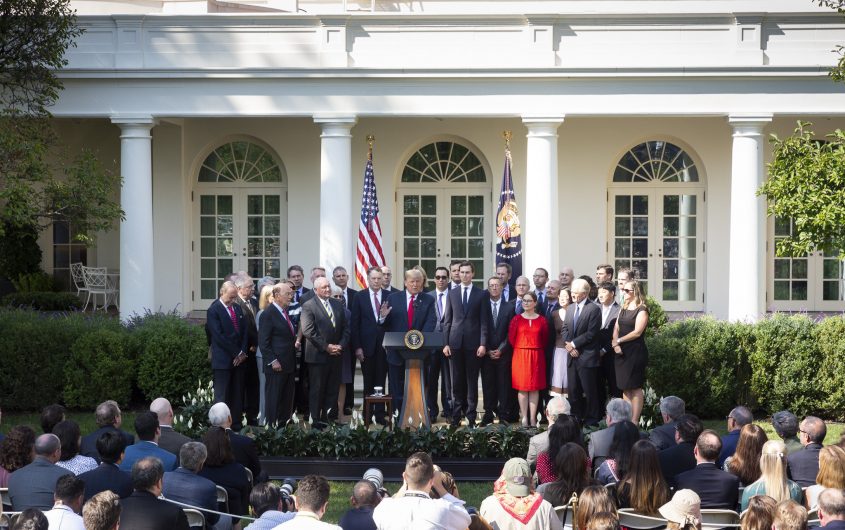
Official White House Photo by Stephanie Chasez
Transatlantic Relations and the Digital Economy Post-USMCA

Melissa K. Griffith
University of California, Berkeley
Melissa K. Griffith is a Ph.D. Candidate in Political Science at the University of California, Berkeley and an affiliated researcher at the Center for Long-Term Cybersecurity (CLTC). Her doctoral research lies at the intersection of security and technology, with a focus on national defense in cyberspace. Her broader research interests include cybersecurity, digitalization, transatlantic relations, and small states’ national defense postures. She was a Visiting Scholar at George Washington University's Institute for International Science & Technology Policy (IISTP) in October 2018; a Visiting Research Fellow at the Research Institute on the Finnish Economy (ETLA) in Helsinki, Finland from 2017-2018; and a Visiting Researcher at the Université Libre de Bruxelles (ULB) in Brussels, Belgium in Fall 2017. Griffith’s published work has appeared in the American Institute for Contemporary German Studies, Business and Politics, the Centre for European Policy Studies, the Council on Foreign Relations, the Cyber Conflict Studies Association, and the Journal of Cyber Policy. In addition to academic conferences, she has presented her work for the World Affairs Council, the Research Institute on the Finnish Economy (ETLA), the Cyber Conflict Studies Association (CCSA), and Sift Science Resources. She holds a B.A. in International Relations from Agnes Scott College (2011) and a M.A. in Political Science from the University of California, Berkeley (2014).
She is a 2018-2019 participant in AICGS’ project “A German-American Dialogue of the Next Generation: Global Responsibility, Joint Engagement,” sponsored by the Transatlantik-Programm der Bundesrepublik Deutschland aus Mitteln des European Recovery Program (ERP) des Bundesministeriums für Wirtschaft und Energie (BMWi).
The TPP is dead, long live the USMCA. Despite the United States withdrawing from the Trans-Pacific Partnership (TPP), the digital trade chapter of the United States Mexico Canada Agreement (USMCA) borrows from and builds off of the earlier TPP’s electronic commerce chapter. It prohibits duties on e-products, such as music and software; bolsters intellectual property protections; bars data localization; protects internet service providers from copyright liability stemming from user content; and requires each of the three countries to establish their own personal data protection (or privacy) laws.
Yet, the USMCA is neither a transatlantic deal nor a biproduct of the Transatlantic Duopoly, which historically set the agenda for the General Agreement on Tariffs and Trade (GATT) and the subsequent transition from the GATT to the World Trade Organization (WTO). Despite the relaunching of transatlantic trade talks in July, when it comes to the digital economy, it was the U.S., Mexico, and Canada that reached a deal first. Transatlanticism is no longer the sole core of U.S. trade policy and, as a consequence, when it comes to data (and how it moves around the world), the U.S. is looking elsewhere to begin setting some of the rules of the road.
Challenges for Europe and the Digital Economy
The completion of the USMCA negotiations and the upcoming ratification process sets two important challenges for Europe and the global digital economy. First, as the first mover, it will limit the EU’s policy options in future negotiations by placing a floor in some domains. While many of the benefits will be felt by signatories of both USMCA and any future EU-U.S. deal, if negotiations are concluded, other benefits, such as setting minimum standards in key areas, may be afforded solely to the partner that finalized their deal with the U.S. first. Second, if a digital trade agreement between the EU and the U.S. is not reached, they risk further balkanization of the “rules of the road” on digital issues as various countries and some country blocs continue to develop their own rules around data (its collection, uses, and movement).
The Upside for Transatlanticism and the Digital Economy
However, while the USMCA may have a first mover advantage over a subsequent EU-U.S. deal, the consequences are not altogether negative for transatlantic relations or the digital economy. Notably, it highlights a wiliness to undertake multilateral agreements, despite the Trump administration’s early focus on a pivot toward bilateralism. Moreover, taken together, the USMCA and any subsequent EU-U.S. deal may yet be an important foundation upon which to include and/or constrain the digital practices of states such as China.
Importantly, such Digital Trade and Investment chapters should not merely be seen as an effort to address the particular trade/investment problems participating states face. They can also be a geo-political undertaking: an opportunity to update trade agreements to the digital realities of the twenty-first century, avoid increasing balkanization of standards and regulations, and re-cement the transatlantic relationship in light of continued deadlock in the WTO.









